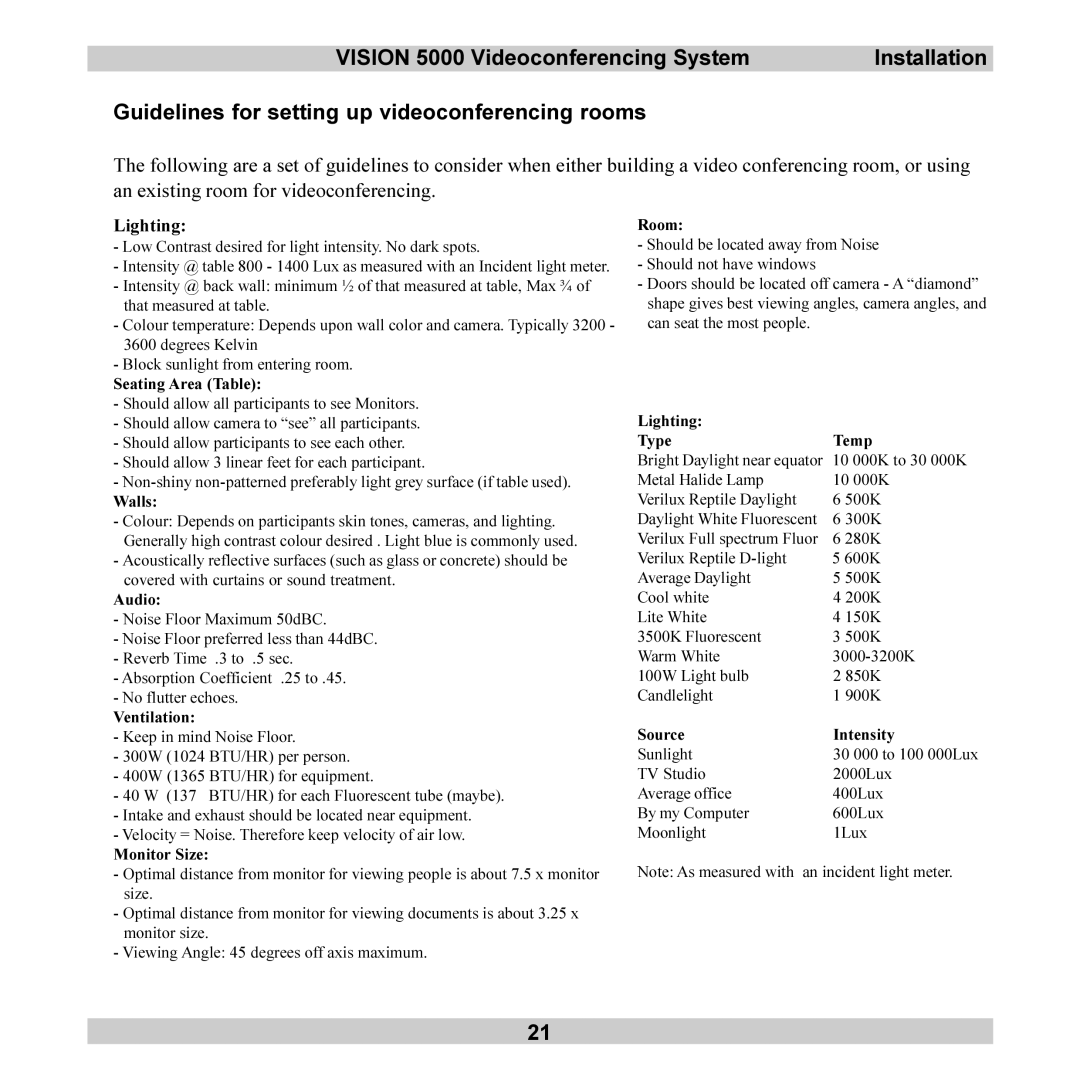VISION 5000 Videoconferencing System | Installation |
Guidelines for setting up videoconferencing rooms
The following are a set of guidelines to consider when either building a video conferencing room, or using an existing room for videoconferencing.
Lighting:
-Low Contrast desired for light intensity. No dark spots.
-Intensity @ table 800 - 1400 Lux as measured with an Incident light meter.
-Intensity @ back wall: minimum ½ of that measured at table, Max ¾ of that measured at table.
-Colour temperature: Depends upon wall color and camera. Typically 3200 - 3600 degrees Kelvin
-Block sunlight from entering room.
Seating Area (Table):
-Should allow all participants to see Monitors.
-Should allow camera to “see” all participants.
-Should allow participants to see each other.
-Should allow 3 linear feet for each participant.
-
Walls:
-Colour: Depends on participants skin tones, cameras, and lighting. Generally high contrast colour desired . Light blue is commonly used.
-Acoustically reflective surfaces (such as glass or concrete) should be covered with curtains or sound treatment.
Audio:
-Noise Floor Maximum 50dBC.
-Noise Floor preferred less than 44dBC.
-Reverb Time .3 to .5 sec.
-Absorption Coefficient .25 to .45.
-No flutter echoes.
Ventilation:
-Keep in mind Noise Floor.
-300W (1024 BTU/HR) per person.
-400W (1365 BTU/HR) for equipment.
-40 W (137 BTU/HR) for each Fluorescent tube (maybe).
-Intake and exhaust should be located near equipment.
-Velocity = Noise. Therefore keep velocity of air low.
Monitor Size:
-Optimal distance from monitor for viewing people is about 7.5 x monitor size.
-Optimal distance from monitor for viewing documents is about 3.25 x monitor size.
-Viewing Angle: 45 degrees off axis maximum.
Room:
-Should be located away from Noise
-Should not have windows
-Doors should be located off camera - A “diamond” shape gives best viewing angles, camera angles, and can seat the most people.
Lighting: |
|
Type | Temp |
Bright Daylight near equator | 10 000K to 30 000K |
Metal Halide Lamp | 10 000K |
Verilux Reptile Daylight | 6 500K |
Daylight White Fluorescent | 6 300K |
Verilux Full spectrum Fluor | 6 280K |
Verilux Reptile | 5 600K |
Average Daylight | 5 500K |
Cool white | 4 200K |
Lite White | 4 150K |
3500K Fluorescent | 3 500K |
Warm White | |
100W Light bulb | 2 850K |
Candlelight | 1 900K |
Source | Intensity |
Sunlight | 30 000 to 100 000Lux |
TV Studio | 2000Lux |
Average office | 400Lux |
By my Computer | 600Lux |
Moonlight | 1Lux |
Note: As measured with an incident light meter.
21
